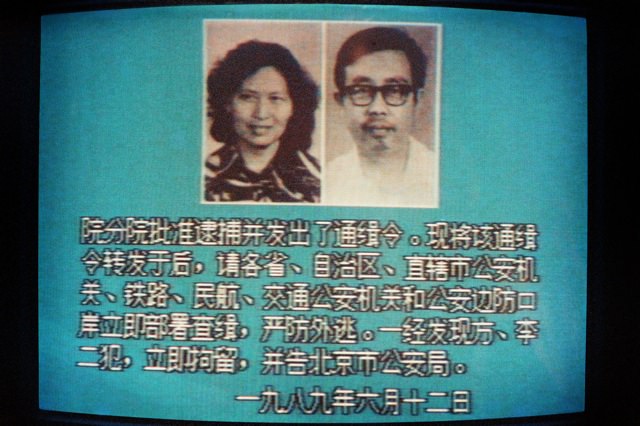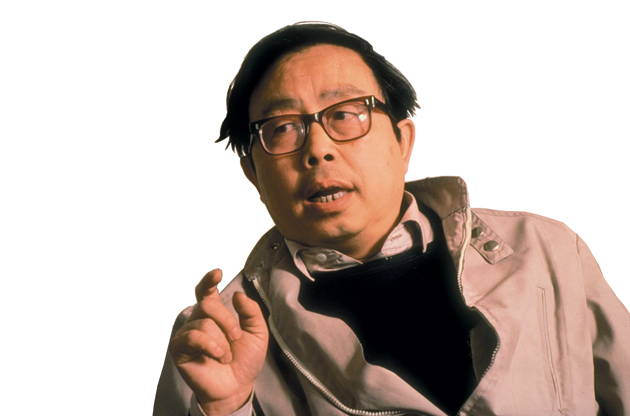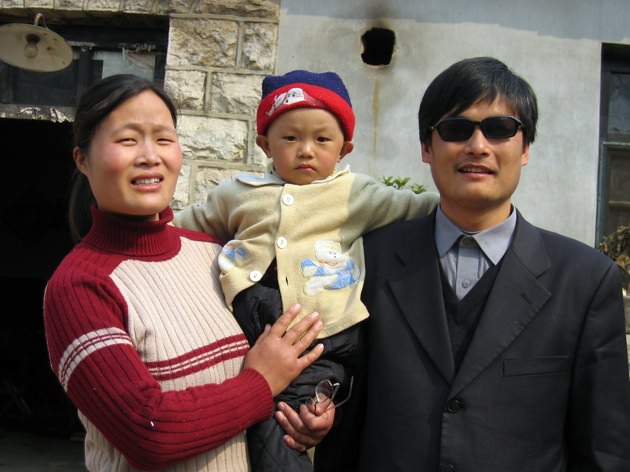The Chinese lawyer Chen Guangcheng, blind since childhood, self-taught in the law, defender of women’s rights to resist forced abortion, thorn in the side of local despots in his home district of Linyi in Shandong province, veteran of a four-year prison sentence on the spurious charge of “organizing a mob to disturb traffic,” and since then victim—along with his wife and daughter—of extra-legal house arrest and occasional beatings, has escaped confinement. Rights activists who helped him have begun to disappear into police custody. Reports say he is sequestered in the US Embassy in Beijing. I do not know what US officials are saying to Chen at the moment, but I can report first hand what they said in a strikingly similar case twenty-three years ago, when the physicists and human rights advocates Fang Lizhi and Li Shuxian took refuge at the US embassy following the Tiananmen Square massacre.
In the Chen case, US diplomats have until now remained quiet, other than to acknowledge that he has become the subject of high-level talks with Chinese officials. If Chen is indeed in their care, they face an awkward problem. Harboring Chen will be an affront to the “face” of Chinese authorities and will complicate efforts to negotiate matters involving Syria, North Korea, trade, currency, and many other issues. (And the timing could not be worse: Secretaries Clinton and Geithner and about 200 other Americans were heading to Beijing on Monday for long-scheduled talks on strategic and economic issues.) It will also lend credibility to charges from Chinese hard-liners that “dissidents” like Chen are puppets of the Americans, who are secretly trying to thwart China’s rise.
On the other hand, to turn Chen over to Chinese authorities would be a public relations disaster for the Obama administration. In early February the US did turn over Wang Lijun, the police chief of Chongqing in western China who is considered a key figure in the Bo Xilai scandal and who showed up seeking refuge at the US consulate in nearby Chengdu. But Wang, a player in the mutual backstabbing among China’s power elite, was about as different a character from Chen Guangcheng as one might imagine and his handover to Chinese officials rightly produced little outcry.
Chen Guangcheng’s case, in contrast, is much closer to that of Fang Lizhi and his wife Li Shuxian, who sought refuge in the US embassy in Beijing on June 5, 1989, the day after the massacre that ended the student democracy movement. Fang and Li had just been listed numbers one and two on a government list of people wanted for “counterrevolutionary incitement.”
I had met Fang in the fall of 1988 when I was serving as director of the Beijing office of the National Academy of Sciences’ scholarly exchange program with China. He had appealed to me for help after the Chinese government had denied him permission to accept invitations to attend scientific meetings in the US. I liked him immediately, and we became friends.
On May 25, 1989, at the height of the demonstrations in Tiananmen Square, I got a phone call from Fang Zhe, Fang’s younger son, who said he wanted to see me about an important matter. He rode his bicycle to the apartment building where my family and I lived, and then asked if we could take a walk outside. He told me that plainclothes police had suddenly become much more aggressive, following and threatening his parents. He was worried. He asked me whether, if things got really bad, they could find refuge in the US Embassy. I explained to him that the National Academy of Sciences is not part of the US government, so I had no way to answer, but that I would see what I could do.
Two days later I met McKinney Russell, the head of the Press and Cultural Section at the US embassy, and put Fang Zhe’s question to him. Russell immediately warned of problems. These things are complicated, he said. He cited the case of József Mindszenty, a cardinal in the Roman Catholic Church of Hungary, who entered the US Embassy in Budapest and had to remain there for fifteen years. But Russell did not say “no.” He said he would make inquiries.
Around noon on June 4, the day of the massacre, I went to Fang’s and Li’s apartment. Their doorbell, as always, played the tune “Happy Birthday to You.” Inside, Li Shuxian was quivering in rage. “They’re crazy! They have genuinely gone crazy!” Fang, by contrast, showed icy control. It was as if he were taking this as a test of human rights principles for his own case. “This is my home,” he said. “I have done nothing wrong. Why should I leave my home?” After half an hour I left, but made it clear I was ready to help if they wanted. Li Shuxian said that, if they did need help, “I will call to invite your children for tea.”
Advertisement
About 5:00 PM my children were invited to tea. During the afternoon friends had called Fang and Li, telling them that they were at the top of the wanted list and urging them to flee. The US Embassy was on the other side of Beijing—not easy to reach, as there were still gunshots and burning vehicles in the streets—and besides it was Sunday. Who would be on duty at the embassy? I brought Fang and Li, with Fang Zhe, to the nearby Shangrila Hotel and rented a room in my own name.
The next morning, in their hotel room, we watched CNN images of tanks grinding through Tiananmen Square. Li Shuxian wanted to go to the embassy; she feared for Fang’s life. Fang, still ambivalent, agreed only to go to “talk about the situation.” We found a taxi, and I invited a young stringer for CBS News to come with us, because I was worried about getting through the embassy gate, where Chinese soldiers would be on duty. My plan was to approach the gate at 17 Guanghua Road myself, show my passport, say I wanted to see McKinney Russell, and then, after the gate was open, physically stand in the opening as the young reporter escorted the Fangs through. As it turned out all of this worked very easily. We arrived about noon.
Inside, Russell dismissed the young CBS reporter. It was clear he did not want press present. We went to Russell’s office in the company of Mark Larsen, another press official for the embassy, and were later joined by Ray Burghardt, the second-ranking official in the embassy. We talked for nearly four hours, interrupted briefly when a line of military trucks drove along Guanghua Road carrying soldiers who fired automatic weapons into the air in an apparent attempt to persuade families in the diplomatic quarter that it was time to leave Beijing. We also saw, on a TV screen in Russell’s office, the original broadcast of the famous image of the lone Chinese protester facing down a row of tanks. No one gasped, however. At the time, that image did not seem exceptional.
Fang asked if he and his family could stay in the embassy for a few days—without publicity and without notifying the Chinese government—until “things became more clear.” The embassy officials apologized that there was no way to keep their presence secret. Chinese embassy staff, whom the Chinese government supplies, had already noticed, and what’s more the room we were talking in was not secure. Hidden microphones were presumably already recording what we were saying. They went on to explain that it was impossible to offer them immediate “political asylum” because, by US law, that status can be granted only when a person is already in the US.
But something called “temporary refuge” was possible. The Fangs would have to request it formally, but once granted, “temporary” could turn out to be a very long time. This would be the first instance of such a case in the People’s Republic of China, and the Chinese government’s response was something we would all have to consider. Fang agreed with the US officials that the regime’s response would likely be to denounce him for seeking protection, to denounce the US for harboring him, and to use his escape to US custody to vilify the whole Chinese democracy movement by saying it was plotted and backed by foreign forces.
Searching for a middle ground between “temporary refuge” and the obvious risk of walking back out onto the streets, the officials suggested that the Fang family apply for US visas, which could be granted the next day. Fang doubted that it would be possible to get to the airport, however. Another problem was that Fang Zhe, their son, did not have a Chinese passport.
At the end of the long afternoon, Fang leaned toward me almost casually and said, zanmen zou ba, “let’s leave.” This was Fang’s decision. The diplomats had made it clear that the family could stay if they really wanted to. But the prospect of giving the government a way to vilify the democracy movement weighed on Fang. Li Shuxian deferred to him, and we left. Out on the street, Fang said, “Actually, if the US were to make a statement about human rights, the best thing would be to take in an ordinary person—a student or a worker, somebody like those who were killed last night. That would be a better than taking in a famous person.”
Advertisement
My college classmate Jay Mathews, a reporter for the Washington Post, had rented room 400 in the nearby Jianguo Hotel, and had told me that we could use it because he needed to go to Shanghai to cover events there. So when we left the embassy I told McKinney Russell where I would be taking the Fang family. We had dinner in the Cantonese restaurant in the Jianguo, and then, about 7:00 PM, I said good-bye and went back to my own family on the other side of the city.
The next morning I called room 400—several times—and could not reach anyone. Not until thirteen months later, when the US and Chinese governments negotiated Fang and Li out of the embassy and into exile, did I learn what had happened. After we left the embassy, the diplomats had reported to Washington and received back an angry phone call instructing them to retrieve Fang and Li immediately. Around 11:00 PM that same night, Burghardt and Russell went to room 400 and invited Fang and Li to the embassy “as the guests of President George Bush.” Washington apparently had realized that if something bad happened to Fang and Li, and if it were known that they had entered the embassy and been sidled away, the US administration would have been in for some fierce criticism.
The dilemmas that the Chen Guangcheng case now presents to the US and Chinese governments are in many ways parallel to what I witnessed in the Fang case. But there are some important differences, too.
The eventual solution of the Fang case was to negotiate Fang’s and Li’s exile: As Fang later wrote in The New York Review, Deng Xiaoping’s key demand in the negotiations was that the US lift its economic sanctions on China—a condition the US was unwilling to meet. But in June 1990, the Japanese government promised to resume loan programs to China, and with that Deng agreed to release Fang and Li as part of the package. The Chinese government demanded in addition that Fang agree to “no anti-China activity” after his release. Fang accepted this demand, but repeatedly made it clear that to criticize China’s ruling regime was hardly “anti-China.” He persisted with his criticisms, which he saw as supportive of China.
Today, for Chen Guangcheng, the two governments might agree that exile is the least awkward solution from their points of view, but Chen may not accept it. Chinese dissidents have learned over the past two decades that exile leads to a sharp decline in a person’s ability to make a difference inside China. Liu Xiaobo, the Nobel Peace Prize winner who is now in his third year of an eleven-year prison sentence for “subversion,” made it clear after his arrest that he would not accept exile as an alternative to prison. From what friends of Chen in Beijing have been saying in recent days, it seems that Chen is taking a similar position.
Another important difference between the Chen and Fang cases is that Chen has a broader following among average Chinese people than Fang had. Fang was a hero to university students and some intellectuals. But most Chinese did not know him, and what they did hear of him were highly distorted accounts in the government-controlled press. Even before the 1989 crackdown, government television was broadcasting images of government-orchestrated “protests” in which farmers were burning Fang Lizhi in effigy. Many people, having no other sources on Fang, accepted such accounts. Today, though, with the Internet, far greater numbers of Chinese—millions of people including many outside of the big cities—know the true story of Chen than ever knew the story of Fang. And to judge from the many accounts circulating on microblogs and elsewhere, hardly anyone seems to view Chen with anything but sympathy.
Chen is seen not as an elite intellectual but as an “ordinary person” who taught himself law to help other ordinary people, and then was imprisoned and persecuted—and is blind to boot. For the Chinese authorities to accuse him of treason or to blame meddling foreigners for helping him will be a hard sell.





